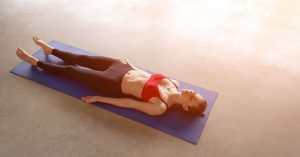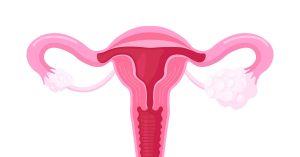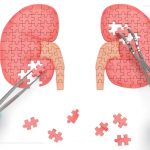Yoga, a 3,000-year-old tradition, is now regarded in the Western world as a holistic approach to health and is classified as a form of Complementary and Alternative Medicine by the National Institutes of Health. Regular yoga practice promotes strength, endurance, and flexibility, as well as friendliness, compassion, and greater self-control, while cultivating a sense of calm and well-being. Yoga practice creates a physiological state that is diametrically opposed to the flight-or-fight stress response, and with that disruption in the stress response, a sense of balance and union between the mind and body can be achieved. Yoga is a type of mind–body fitness that combines muscular activity with an internally directed mindful focus on self, breath, and energy awareness.
Yoga is recognized as a type of mind–body medicine that integrates a person’s physical, mental, and spiritual components to improve health, particularly stress-related illnesses. Evidence suggests that stress plays a role in the development of heart disease, cancer, and stroke, as well as other chronic conditions and diseases. Because stress is linked to a variety of diseases, it is critical to prioritize stress management and the reduction of negative emotional states in order to reduce the disease burden. Yoga’s scientific study has grown significantly in recent years, and many clinical trials have been designed to evaluate its therapeutic effects and benefits.1

In a randomized controlled trial of weekly yoga classes vs. health education classes in individuals with elevated depression symptoms and antidepressant medication use, over time, yoga participants demonstrated significantly improved social and role functioning, as well as general health perceptions. They also had fewer depressive symptoms over the course of the study, suggesting that yoga benefits can build up over time.2
Yoga Nidra is a type of yoga practice to scan the body to explore physical sensations and emotions, assisting the person in becoming aware of symptoms that may be associated with good or bad feelings. Sumedh Mankar et al. in their study analyzed the effects of Yoga Nidra exercises on symptoms associated with depression and anxiety symptoms in psychiatric patients. The use of Yoga Nidra appeared to have facilitated an improvement in the study subjects’ self-reported depression and anxiety levels.3

Kim E. Innes and Terry Kit Selfe showed that yoga may be an effective intervention for older women with restless leg syndrome in terms of improving sleep, mood, perceived stress, and blood pressure. RLS (restless legs syndrome) is a disturbing and potentially debilitating sleep disorder. RLS is characterized by a strong desire to move one’s legs accompanied by unpleasant sensations in the legs that begin or worsen during periods of inactivity, is more severe during evening and nighttime hours, and is partially or completely alleviated by movement.4
Yoga has been shown in studies of women with breast cancer to reduce fatigue and improve sleep quality, physical vitality, and overall quality of life. The results of a yoga study involving 126 women recently diagnosed with Stage I or II breast cancer were presented at the 2003 annual meeting of the American Society of Clinical Oncology (ASCO). The women were about to start chemo or hormonal therapy. Over a three-month period, some of the women were assigned to yoga classes. When compared to those who did not participate in the yoga classes, the women who did had a 12% improvement in fatigue, physical functioning, and quality of life. The findings of a yoga study from the M.D. Anderson Cancer Center were published in 2006. The study followed 61 women who were undergoing breast cancer radiation treatment for 6 weeks. Half of the women went to yoga twice a week, while the other half did not. Women in the yoga group reported having more energy and less daytime sleepiness, better physical functioning, and a higher overall quality of life than women in the control group. However, the risk of inexperienced instructors, lymphedema, and fracture in people with bone metastasis should be considered by cancer patients before practicing yoga.5
Yoga can help lower blood pressure, cholesterol, and glucose levels, as well as heart rate, making it an effective lifestyle intervention. One study found that middle-aged adults with metabolic syndrome who practiced yoga for three months showed improvement in blood measurements and waist circumference (a marker for heart disease). Another study found that taking slow-paced yoga classes twice a week reduced the frequency of atrial fibrillation episodes in people with the condition. Another study found that patients with heart failure who participated in an eight-week yoga program improved their exercise capacity and quality of life. They also had lower blood levels of inflammation markers, which contribute to heart disease.6
According to a recent study, practicing yoga may help reduce testosterone levels and relieve anxiety and depression symptoms in women with PCOS. Participants who attended a one-hour yoga class three times a week for three months reduced testosterone levels by 29%.7
Valarmathi Selvaraj et al. showed that yoga and exercise were beneficial in minimizing PCOS risk. Most of the girls had more energy and were no longer depressed (as depression is associated with PCOS). It is also essential to note that exercise and yoga can significantly improve an individual’s psychological aspects because yoga involves both the body and the mind.8

References:
- https://www.ncbi.nlm.nih.gov/pmc/articles/PMC3193654/
- https://yogafordepression.com/wp-content/uploads/yogafordepression.com-uebelacker2017-had-rct-primary-outcome.pdf
- http://yogafordepression.com/wp-content/uploads/lifeforceyoga-nidra-depression-study-final-2014.pdf
- http://yogafordepression.com/wp-content/uploads/Innes-2012-Yoga-and-RLS-in-older-women1.pdf
- https://www.breastcancer.org/treatment/complementary-therapy/types/yoga
- https://www.hopkinsmedicine.org/health/wellness-and-prevention/the-yoga-heart-connection#:~:text=Yoga%20as%20Heart%20Booster&text=In%20another%20report%2C%20patients%20with,which%20contributes%20to%20heart%20disease.
- https://www.healthline.com/health/yoga-for-pcos#yoga-and-pcos
- https://www.ncbi.nlm.nih.gov/pmc/articles/PMC7717472/

MDForLives is a global healthcare intelligence platform where real-world perspectives are transformed into validated insights. We bring together diverse healthcare experiences to discover, share, and shape the future of healthcare through data-backed understanding.




